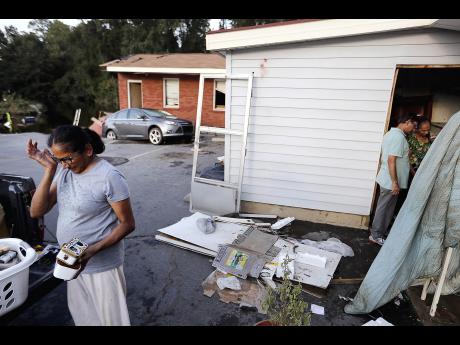Cedric Stephens | Psychology offers valuable insights into risky behaviours
Evan Thompson is an expert on local weather. He heads the Meteorological Service of Jamaica. The Met Service collects, analyses and interprets weather data like rainfall or its absence, temperature, wind direction and speed and sea level pressure.
During June to November each year - the hurricane season - it plays an even more important role. It monitors and tracks the movements and life cycles of weather systems that can develop into tropical storms and hurricanes. These events often pose threats to lives and property. The Met Service shares information with other government agencies and the public.
Mr Thompson submitted an article to this newspaper which appeared on Wednesday, September 19 - seven days after the 30th anniversary of Hurricane Gilbert, one year after Hurricane Maria killed nearly 3,000 persons in Puerto Rico, and in the wake of Tropical Storm Isaac this month, facts the expert was aware of - with an odd headline: "Who cares about the forecasts, anyway?" He remarked that he found it "... very interesting the way many of our people think, and how much interest is shown in the weather and preparedness for severe weather conditions (and), whether we take advantage of weather forecasts. ..."
Forecasters, he argued, no doubt referring members of the team he leads, monitored "every movement, apprising themselves of all available material, including output(s) of sophisticated numerical weather prediction models to determine the most likely path and best guess relating to impact on Jamaica. ..."
I concluded that he was very disappointed by the indifferent response of most citizens to the threats posed by another weather system that had the potential to cause death and destruction.
Apathetic behaviour
His reaction is understandable. The apathetic behaviour that he described, however, is not limited to weather forecasts or to persons in Jamaica. It is something that occurs daily. It also happens overseas and applies to subjects other than weather.
Late last week, for example, I learnt that only two per cent of householders and businesses in the Carolinas, two states that were severely affected by floods caused by Hurricane Florence, bought insurance against that type of event. Locally, insurers experience a spike in enquiries for hurricane insurance when there is a probability of a direct hit. 'Countering disaster through preparation' was published in this column three months ago. It highlighted the need for preparedness during the 2018 hurricane season. Banks and insurance companies were invited to get similar messages out. None of them did so, to my information. Why?
Many motorists ignore information about risks and road safety. Most traffic deaths are caused by persons who speed. Limits posted on signs are not adhered to. Witness what happens daily on the Mandela Highway where extensive roadworks are under way and warning signs are posted. Most drivers appear oblivious of the need to exercise caution. They are "convinced that (if something untoward was to happen as they floor their gas pedals) that their vehicle would not be the one to spin out of control". This type of behaviour, called optimism bias by psychologists, assumes that such an incident is more likely to affect another driver.
Risk-taking behaviour is a field of study that psychologists study. Frank Licata, an American risk-control expert, writing to chief financial officers in a recent article, 'Risk Psychology invites Exposure to Black Swans', argued that companies - and by my inference individuals - need to have "clear heads and coherent strategies with weather events ... too often they fail to take proper precautions. ..."
Difficult to predict
The term Black Swan event is used as a metaphor. It refers to an event whose occurrence comes as a surprise. It deviates from the normal, is very difficult to predict and has a major effect. It is often "inappropriately rationalised after the fact and with the benefit of hindsight." Tropical storms, hurricanes and earthquakes do not fall within the description of Black Swan events because of the regularity of their occurrence. Jamaica has lost 2.4 per cent of its gross domestic product (GDP) each year for the last 50 years but many persons are unaware of this fact. Slightly more than one-quarter of GDP, 26 per cent, was destroyed in 1988 by Hurricane Gilbert. Fewer persons know that there were 324 natural disasters in the Caribbean since 1950. The total economic impact of them was estimated at US$22 billion.
Many of us suffer from a condition that psychologists call availability bias. We think that the likelihood of an event is proportional to the ease with which we can recall something happening. An example that comes easily to mind affects our decision-making or reasoning. We are also prone to hindsight bias - a tendency to think that past events were more predictable than they were. Students of human behaviour will also say that individuals in a group will often monitor the behaviours of others around them before deciding how to act - a condition called the bystander apathy effect.
It is my hope that this article will convey to Mr Thompson and members of the team that he leads public appreciation for the important work that they do each day - and especially during the hurricane season. The good news is that the Government says that it is developing a 'Public Financial Management Policy for Natural Disaster Risk' - something that should have been done many years ago and that will help to reduce the apathy that we have to towards risks in the society.
- Cedric E. Stephens provides independent information and advice about the management of risks and insurance. For free information or counsel write to aegis@flowja.com.


